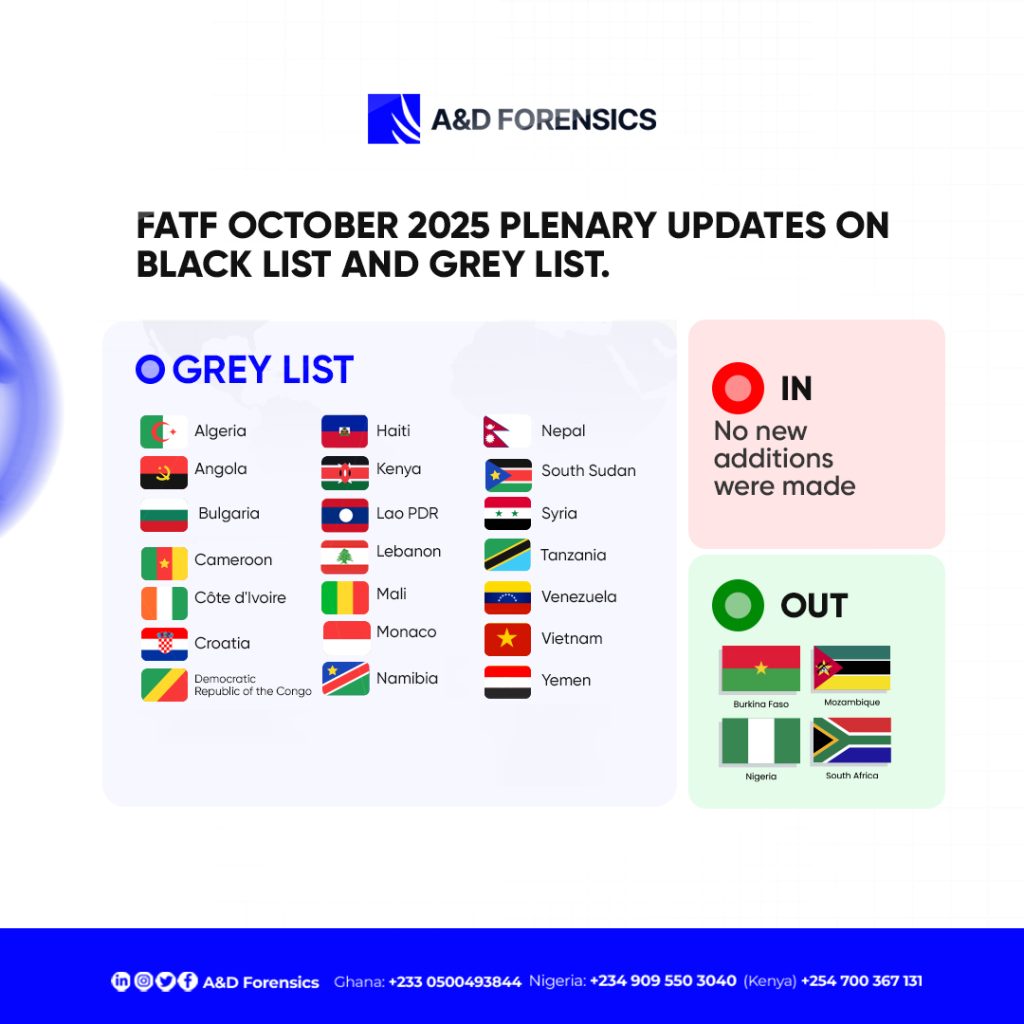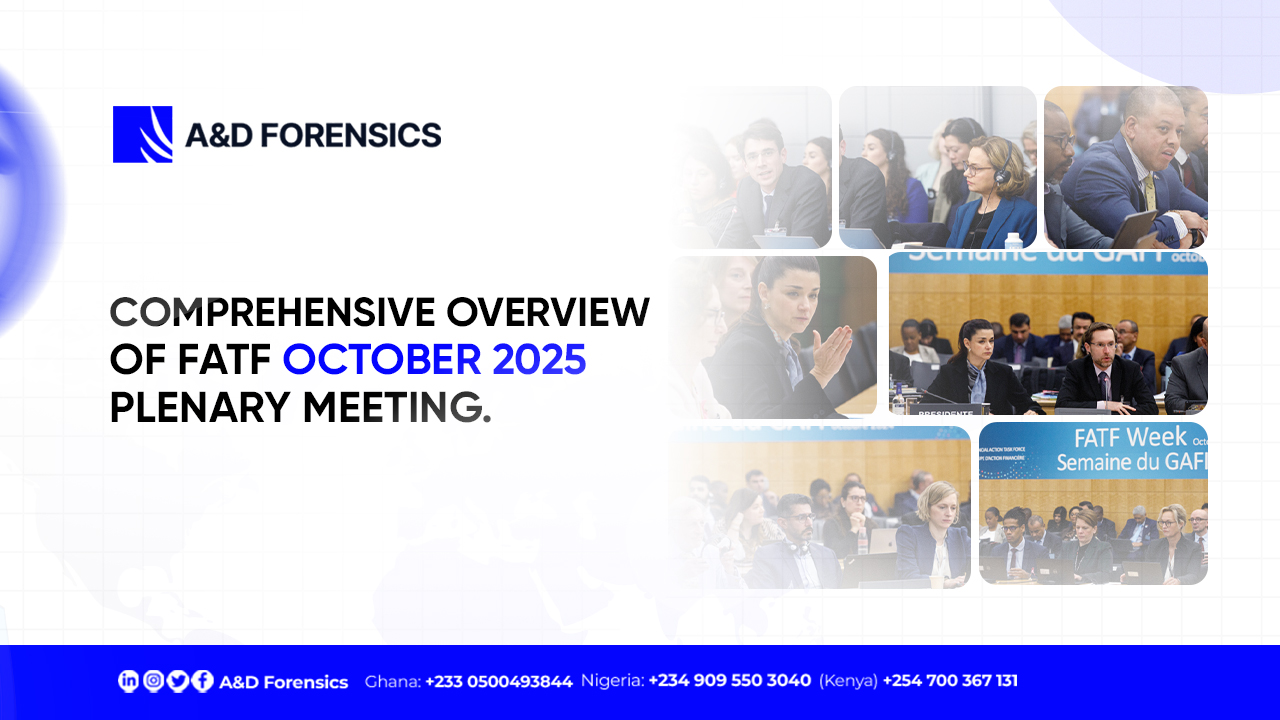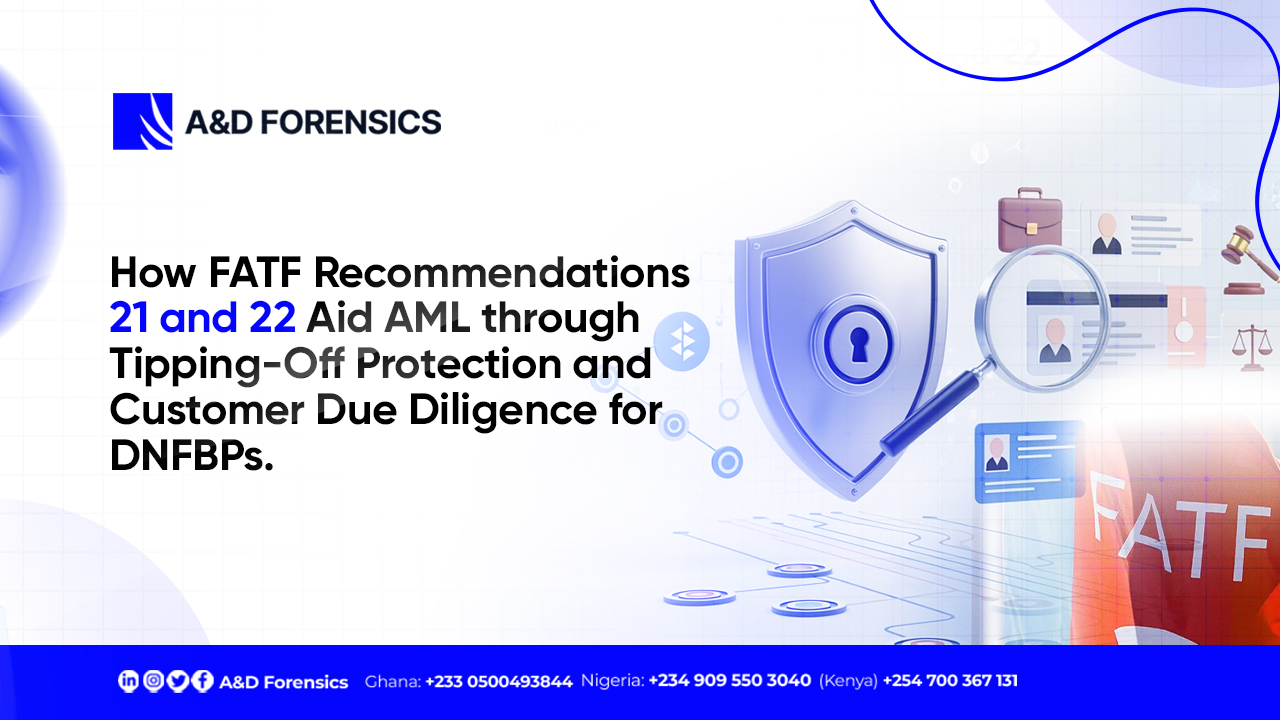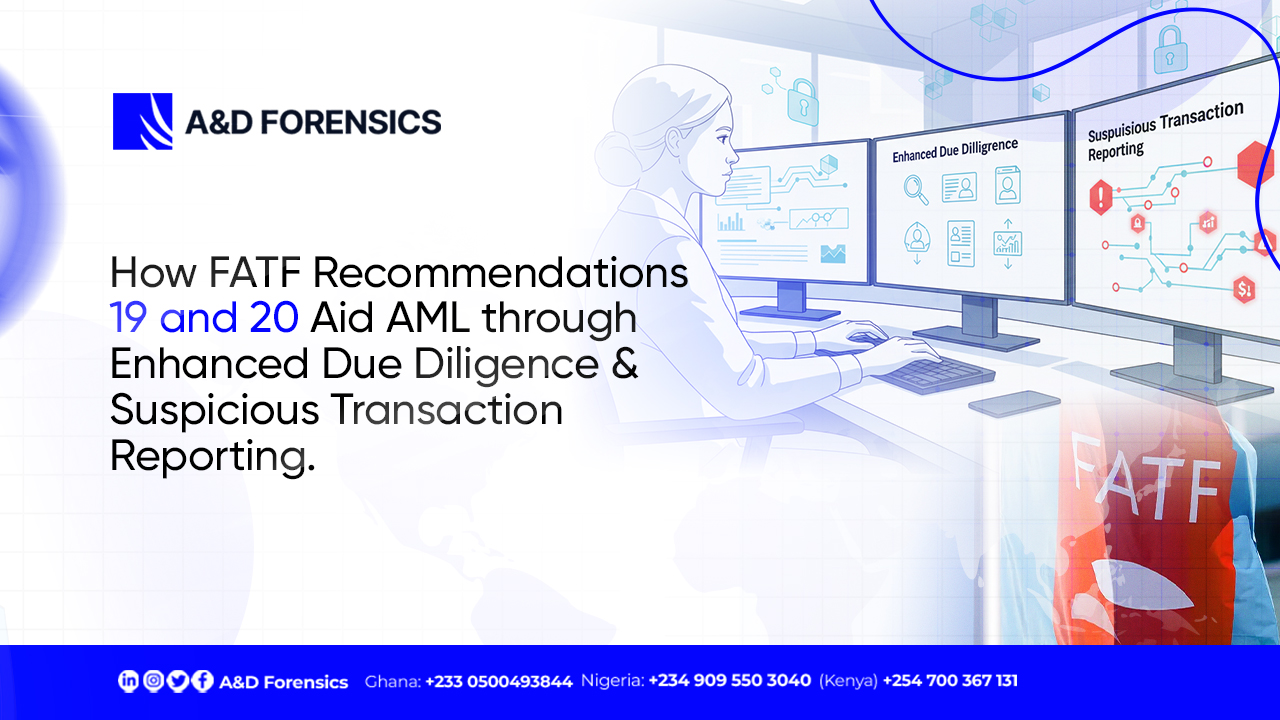The FATF October 2025 Plenary, held in Paris from 22 to 24 October 2025, marked another milestone in the Financial Action Task Force’s (FATF) mission to strengthen global safeguards against money laundering, terrorist financing, and proliferation financing. Chaired by Elisa de Anda Madrazo of Mexico, the three-day meeting brought together delegates from over 200 jurisdictions to evaluate ongoing reforms, adopt new guidance, and address emerging financial crime risks.
The discussions and outcomes underscored a clear message, the FATF October 2025 Plenary is steering the global AML/CFT community from policy adoption toward measurable impact. The focus is now on effectiveness, accountability, and adaptation to the realities of a fast-evolving digital and geopolitical landscape.
FATF October 2025 Plenary Updates on Black list and Grey list.
Jurisdictions no longer under Increased Monitoring (Grey List):
- Addition to the Grey List: No new additions were made to the Grey List during the FATF October 2025 Plenary, but four countries were removed.
- Removal from the Grey List: After on-site visits and progress reviews, the FATF congratulated Burkina Faso, Mozambique, Nigeria, and South Africa for completing their Action Plans within the agreed timeframes. These jurisdictions were removed from FATF’s “increased monitoring” process and will continue collaborating with their respective FATF-Style Regional Bodies (FSRBs):
- Burkina Faso and Nigeria- GIABA (West Africa)
- Mozambique- ESAAMLG (Eastern & Southern Africa)
- South Africa (as FATF member)- in coordination with ESAAMLG.
- Burkina Faso: After four years on the Grey List, Burkina Faso was delisted during the FATF October 2025 Plenary following significant AML/CFT progress. The Plenary highlighted the country’s stronger risk-based supervision, improved access to beneficial ownership data, implementation of targeted financial sanctions, and enhanced law enforcement capacity to combat terrorist financing.
- Mozambique: The FATF October 2025 Plenary commended Mozambique for addressing the AML/CFT gaps that led to its 2022 greylisting. Key improvements included stronger inter-agency cooperation, enhanced law enforcement training, better use of financial intelligence, completion of a terrorist financing risk assessment, and improved access to accurate beneficial ownership information.
- Nigeria: After more than two years on the Grey List, Nigeria was officially removed during the FATF October 2025 Plenary following major reforms. These included completing a national ML/TF risk assessment, strengthening AML/CFT strategies, enhancing supervision of high-risk sectors, improving international cooperation, increasing prosecutions, and refining oversight of non-profit organizations vulnerable to terrorist financing.
- South Africa: Listed in February 2023, South Africa achieved delisting at the FATF October 2025 Plenary after demonstrating notable progress. FATF recognized efforts such as improving risk-based supervision of DNFBPs, ensuring access to beneficial ownership data, enforcing reporting compliance, updating terrorist financing risk assessments, and intensifying investigations into complex ML/TF cases.

Jurisdictions Under Call for Action (Black List):
The FATF October 2025 Plenary updated its public statement on high-risk jurisdictions under a Call for Action. Notably, the status of the Islamic Republic of Iran remains unchanged, the FATF reaffirmed concerns that Iran has not sufficiently completed its action plan. Other jurisdictions under the Call for Action include the Democratic Republic of Korea and Myanmar.
Mutual Evaluations of Belgium and Malaysia.
At the heart of the FATF October 2025 Plenary were the mutual evaluation reports of Belgium and Malaysia, adopted under the new round of evaluations. Unlike earlier cycles, the updated framework emphasizes measurable effectiveness and faster remediation. Countries now receive a clear roadmap of Key Recommended Actions to be implemented within three years. Following a quality and consistency review, the reports will be published in December 2025, detailing the specific actions expected from both jurisdictions.
Key Outcomes of the FATF October 2025 Plenary.
- New Guidance on Asset Recovery: The Plenary also introduced a new Guidance on Asset Recovery, addressing one of the most persistent gaps in global AML/CFT efforts: the low rate of confiscating criminal proceeds. This guidance outlines best practices to help countries trace, freeze, and recover illicit assets more effectively both domestically and across borders. By focusing on “turning financial intelligence into real recovery,” the FATF aims to close the loop between detection and deterrence.
- Emerging Technology and AI Risks (Artificial Intelligence (AI) and Deepfakes): In recognition of the rapidly evolving digital landscape, the FATF October 2025 Plenary endorsed a new Horizon Scan to examine how artificial intelligence (AI), deepfakes, and other emerging technologies are shaping the future of financial crime. This initiative warns that generative AI tools and synthetic media are being weaponized by criminals, enabling sophisticated identity fraud, cyber-enabled money laundering, and disinformation. FATF urged both the public and private sectors to update their risk frameworks, strengthen digital identity verification, and collaborate on developing ethical AI safeguards.
- Strengthening the Global FATF Network: At the heart of the FATF October 2025 Plenary were the mutual evaluation reports of Belgium and Malaysia, adopted under the new round of evaluations. Unlike earlier cycles, the updated framework emphasizes measurable effectiveness and faster remediation. Countries now receive a clear roadmap of Key Recommended Actions expected to be implemented within three years. The approach signals FATF’s determination to ensure that national AML/CFT systems don’t just look strong on paper, they must demonstrate real-world results.
- Membership / Suspension Update: The FATF October 2025 Plenary reaffirmed the continued suspension of Russia’s membership, maintaining its stance due to ongoing geopolitical concerns.
Implications for Financial Institutions and the Crypto Industry.
The outcomes of the FATF October 2025 Plenary carry important implications for banks, regulators, and crypto businesses worldwide. Key takeaways include:
- Effectiveness over formality: FATF is prioritizing proven outcomes over box-ticking exercises. Financial institutions must demonstrate that AML/CFT programs genuinely mitigate risks.
- Asset recovery focus: Expect increased collaboration between regulators, law enforcement, and private institutions on asset tracing, including crypto assets.
- AI-driven compliance: Organizations should assess their exposure to AI-related risks and enhance technological safeguards accordingly.
- Africa’s growing role: With several African nations removed from monitoring, regional regulators will likely tighten enforcement to sustain progress and credibility.
- For crypto-asset service providers (CASPs) and Web3 startups, these developments highlight the importance of risk-based compliance. As FATF’s focus expands to include AI, DeFi, and blockchain forensics, compliance teams must ensure that their tools and frameworks are future-ready.
The next FATF Plenary is scheduled to take place in February 2026, in Mexico City.
Conclusion.
The FATF October 2025 Plenary reaffirmed the organization’s commitment to moving from policy formulation to measurable impact in the global fight against money laundering, terrorist financing, and proliferation financing. By addressing emerging risks linked to artificial intelligence, digital identity, and asset recovery, the FATF October 2025 Plenary emphasized that the future of financial integrity depends on adaptability, collaboration, and innovation. As the global community looks ahead to the February 2026 Plenary in Mexico City, expectations remain high for continued progress in translating FATF standards into real-world effectiveness.
For professionals, regulators, and institutions, the takeaways are clear: compliance must evolve alongside technology, and sustained commitment is key to maintaining trust and stability in the global financial system.
You can find previous FATF Plenary coverage from A&D Forensics here:
Co Author: Ibrahim Anuoluwapo Azeez






